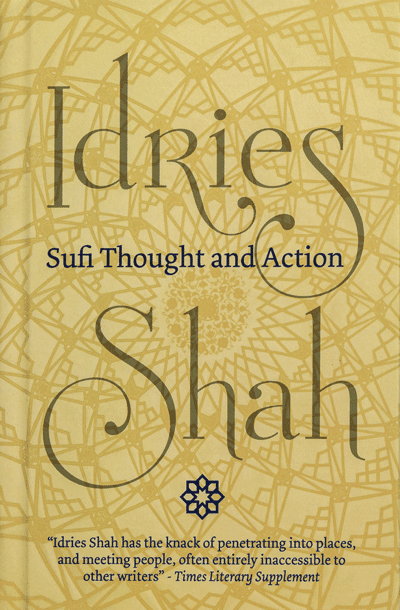An anthology revealing the extraordinary diversity of Sufi ideas and activities in many countries and cultures around the world today.
Sufi Thought and Action is a collection of essays – assembled and introduced by Idries Shah that explore the varying aspects and approaches to Sufism from the medieval period to modern times. Over two dozen authors from East and West draw from their unique perspectives to illuminate genuine Sufi methodologies.
In addition to first-hand accounts of Sufi learning methods, subjects covered include: the Sufi meeting place, avoiding imitators, Sufi work enterprises, worldly and spiritual progress, entry into a Sufi group, the Sufi adept and the projection of mind, extrasensory perception, and more.
Shah’s introduction begins, ‘The object of Sufi spiritual teaching can be expressed as: to help to refine the individual’s consciousness so that it may reach the Radiances of Truth, from which one is cut off by ordinary activities of the world.’
Through its patchwork of specialist testimonies, Sufi Thought and Action forms a picture of the immemorial wisdom tradition that underscores all others.
1. Sufi Spiritual Rituals and Beliefs
by Idries Shah
2. Sufi Principles and Learning Methods
Seven papers by Humayun Abbas and Others
Trust – Humayun Abbas
Sufi Activity – Emir Ali Khan
Sufi Learning Methods – Benjamin Ellis Fourd
The Sufis on the Scholars – Mohandis el Alouite
The Sufi Meeting Place – Ferrucio Amadeo (Faruq Ahmad)
Avoiding Imitators – Gashim Mirzoeff
The Western Seeker Seen through Eastern Eyes – Alirida Ghulam Sarwar
3. Current Sufi Activity: Work, Literature, Groups and Techniques
by Chawan Thurlnas
Their Work Enterprises
Sufi Use of Literature
Controlling Oneself
Discouraging Potential Recruits: ‘Deflection’
The Idea of Organic Enterprises
Entry into a Sufi Group
The Sufis as a Cult
Religion, Evolution and Intervention
Representative Writings: Tradition and Potentiality
4. Ritual, Initiation and Secrets in Sufi Circles
by Franz Heidelberger and Others
Time Spent among Sufis – Franz Heidelberger
The Sufi Adept and the Projection of the Mind
Priest, Magician and Sufi
The Learner’s and the Teacher’s Viewpoints
The Three Major Lessons
The Sufis in Current Idiom
Sufi Orders – Rosalie Marsham
Ritual and Perception
Exercises, Movements, Costumes
The Ineffable Secret
The Chain of Initiation
Founders and Early Masters
Special Selection for Teachings and Students
Effect of Hierarchy and Tradition
Observation of a Sufi School – Hoda Azizian
Primary, Secondary and Deteriorated Schools
Materials, Attunement, Energy and Focus
Extra-sensory Perception
Worldly and Spiritual Progress
Tests: True and False Sufis – Judging the Teacher
The Path of Blame and Other Technicalities
Other Works
5. Theories, Practices and Training Systems of a Sufi School
by Canon W.H.T. Gairdner
6. Key Concepts in Sufi Understanding
edited by Professor Hafiz Jamal
Those Astonishing Sufis – Adilbai Kharkovli
The General Principles of Sufism – Sirdar Ikbal Ali Shah
Sufism and the Indian Philosophies –
Sirdar Ikbal Ali Shah
7. Visits to Sufi Centres: Some Recent Research Papers on Sufis and Sufism
by Djaleddin Ansari and Others
Basic Teachings of the Sufis – Djaleddin Ansari
The Dinner-meeting and Other Topics –
Abdul-Wahab T. Tiryaqi
Making Sense of Sufi Literature, Experts, Paradox –
Andrew C.C. Ellis
Aphorisms of a Sufi Teacher – Hilmi Abbas Jamil
Three Forms of Knowledge, according to the
Naqshbandi School – Gustav Schneck
8. The Sufis of Today
by Seyyed F. Hossain
Summary
The Sufis of Today
Reviews and Comments on Sufi Affairs
9. In a Sufi Monastery and Other Papers
In a Sufi Monastery – Najib Siddiqi
Vanity and Imitation – Fares de Logres
Sufis over Two Centuries – Valentino de Mezquita, Sr
What the Sufis Do Not Want Us to Know –
Edwin Clitheroe
Two Sufi Lectures – Hafiz Jamal
Religion as Repetition or Experience
Outer and Inner Activity and Knowledge
Conversation with a Sufi Master – Aziza Al-Akbari
Sufi Spiritual Rituals and Beliefs
OBJECT OF SUFI TEACHING:
The object of Sufi spiritual teaching can be expressed as:
to help to refine the individual’s consciousness so that it
may reach the Radiances of Truth, from which one is cut
off by ordinary activities of the world. The term used for
illuminations or radiances is Anwar.
From Sufi Thought and Action by Idries Shah
Copyright © The Estate of Idries Shah
Idries Shah was born in India in 1924 into an aristocratic Afghan family. He was an author and teacher in the Sufi tradition and is considered one of the leading thinkers of the 20th century.
Shah devoted his life to collecting, translating and adapting key works of Sufi classical literature for the needs of the West. Called by some 'practical philosophy' - these works represent centuries of Sufi and Islamic thought aimed at developing human potential. His best-known works include the seminal book The Sufis, several collections of teaching stories featuring the ‘wise fool’ Nasrudin, Reflections and Knowing How to Know.
Shah's corpus - over three dozen books on topics ranging from psychology and spirituality to travelogues and cultural studies - have been translated into two dozen languages and have sold millions of copies around the world. They are regarded as an important bridge between the cultures of East and West.
Paperback
Amazon paperback
Bookshop.org paperback
ISBN: 978-1-78479-090-5
Language: English
Number of pages: 322
Hardcover
Amazon hardcover
Bookshop.org hardcover
ISBN: 9781784798956
Language: English
Number of pages: 324
Ebook - Kobo
Kobo eBook
ISBN: 978-1-78479-092-9
Number of pages: 295
Duration: 6-7 hours to read
Total words: 80k
Ebook - Kindle
Kindle Edition
ASIN: B09CH55CKP
Print length: 236
File size: 2176 KB
Audiobook
Audible Audiobook
ASIN: B07J5V3MQ8
Listening length: 9 hours 58 minutes
Narrator: David Ault
All editions of Sufi Thought and Action published by ISF are available in American-English Editions.
